

EXPE and BKNG: Travel Titans Poised for Record-Breaking Year
| March 28, 2024 |
- Booking Holdings (BKNG) and Expedia Group (EXPE) are leading players in the OTA (Online Travel Agency) market, with BKNG dominating the European market and EXPE holding a larger share in the US.
- Both BKNG and EXPE are investing in AI to drive personalization of offerings and new large-scale rewards offerings.
- Travel spending is on the rise, with consumers prioritizing travel over other expenses, indicating a strong rebound in the travel industry.
- The alternative accommodation market is a key growth area for both companies, with EXPE’s Vrbo and BKNG’s expansion in non-hotel offerings with Booking.com.
Overview
In the past decade, the OTA (Online Travel Agency) industry has become more concentrated, with two players emerging on top: Booking Holdings (BKNG) and Expedia Group (EXPE). These OTAs represent a significant portion of the market—some 92% of the US OTA market—and command considerable pricing power with both consumers and service providers. Additionally, their combined brand portfolios hold significant brand recognition among consumers of all income levels and travel service consumption trends. The global travel market is expected to grow at above GDP levels, averaging 3.5% CAGR to breach just over $1 trillion per year in 2028.
While the post-COVID shakeout of OTAs is still underway, there is still a significant portion of market share to capture across geographies. As it stands in the US, EXPE is undoubtedly the leader, with an estimated 60-75% of the market share by gross bookings. The story is almost exactly the opposite in Europe, with BKNG holding 70-80% of the market share by gross bookings. Both EXPE and BKNG have committed to expanding market share in their rival’s territory. In our view, EXPE’s battle is more uphill. While BKNG has substantial offerings for US consumers and 15-20% of US market share, EXPE has relatively little consumer penetration in Europe, and it is focusing heavily on B2B offerings to get a ‘foot-in-the-door’.
| Expedia Group (EXPE) | Booking Holdings (BKNG) | Airbnb (ABNB) | |
| Closing Price | $137.10 | $3633.16 | $168.59 |
| EPS (2024E) | $12.00 | $175.03 | $4.33 |
| EPS (2025E) | $15.00 | $205.33 | $4.94 |
| EPS (2026E) | $16.65 | $232.02 | $5.93 |
| Gross Buyback Authorized (%) | 25.7% | 11.2% | 5.5% |
| Gross Buyback Authorized ($B) | $4.8 | $14.0 | $6.0 |
| Market Cap. ($B) | $18.7 | $124.0 | $109.0 |
| Dividend Yield (2024E) | 0.00% | 1.00% | 0.00% |
| Net Income Margin | 5.36% | 20.07% | 48.32% |
| EV/EBITDA | 7.1 | 16.0 | 24.7 |
| FCF ($B) | $1.8 | $7.0 | $3.9 |
| PEG (2024E) | 1.0 | 1.6 | 1.9 |
| P/E (2024E) | 11.4 | 20.7 | 38.9 |
| P/E (2025E) | 10.9 | 17.7 | 34.1 |
| P/E (2026E) | 8.2 | 15.7 | 28.4 |
| P/S (2024E) | 1.3 | 5.4 | 9.7 |
| P/S (2025E) | 1.2 | 4.9 | 8.7 |
| P/S (2026E) | 1.2 | 4.5 | 7.7 |
A Symbiotic Relationship Embraced
One of the key value drivers for OTAs is their ability to leverage the network effect, creating a virtuous cycle for everyone: customers get more options, service providers get more revenue channels, and OTAs gain brand recognition. EXPE estimates that 80% of all travelers in 2023 utilized an OTA to compare options, even if they didn’t complete a purchase there, with 65% of direct bookings with hotels originating from research started at an OTA.
Growth Factors
Over the short and medium term, growth will likely come from recouping consumer travel expenditures, with 2024 projected to surpass pre-pandemic volume. Over the long term, the resumption of the intense rivalry between BKNG and EXPE will likely spur another flurry of M&A activity, particularly in the APAC (Asia Pacific) region, where home-grown OTAs still have a significant market share. Here, too, BKNG has the upper hand, already offering Agoda, an OTA primarily geared toward APAC consumers.
The great equalizer is the rise of AI-powered offerings by both BKNG and EXPE. Both aim to integrate experiences like restaurants or tours into suggestions and personalize travel planning to drive loyalty and upselling volume. Generative AI holds significant potential for hyper-personalization in the travel market, which could bridge the gap between customer preferences and OTA listings. With record travel expected in 2024, it will be a key year to observe how travelers receive AI-driven innovations and their impact on the competitive landscape.
State of the Consumer
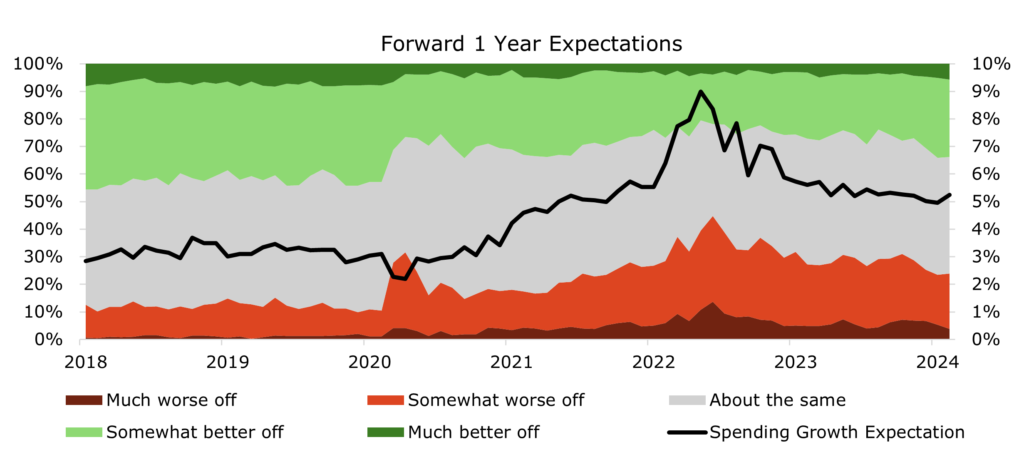
In our article on the state of the consumer, we go into more detail. As restrictions came into effect during the pandemic, aggregate spending on travel declined by 50%, which posed an existential threat to the industry’s volume. Consumers are still grappling with sticky inflation and a rising cost of living. However, there has been some forward movement in both forward spending expectations and how well-off consumers expect to be.
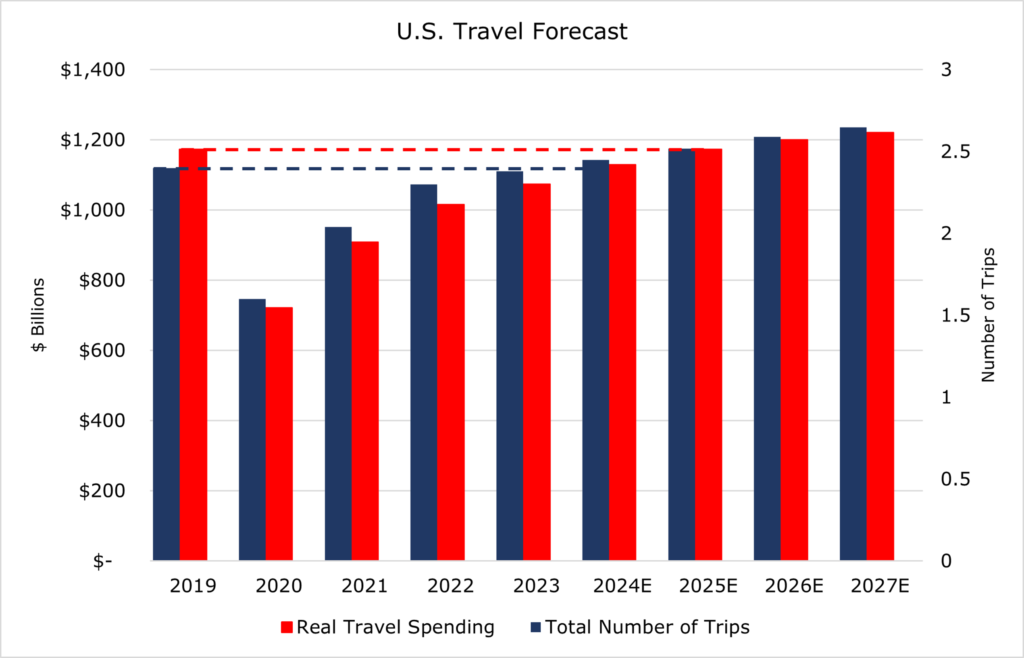
Ipsos and Hilton polling show that consumers will increase travel spending over 2024, with 64% of respondents stating that they would cut other areas of spending to prioritize travel. RBC cardholder data for the first quarter of 2024 backs this up, demonstrating that despite eating out far less, consumers are on track for continued strength in the 2024 peak season. Of American consumers, 93% of them plan to travel by July 2024, the highest level in three years.
Inflation has remained sticky in the US, with the first-rate cut now expected in September, expecting a year-end interest rate of 4.0%. Retail gasoline price decreases and growth in real disposable income are expected to boost consumer spending further, which could pose more inflationary problems. Although the US economy is expected to perform better than the Eurozone, it is still marred by serious uncertainty.
Air travel data remains strong, with the IATA expecting air travel growth trends to breach pre-pandemic levels and finally return to form. Overall, international travel to the US is on the rise but has not fully recovered to pre-pandemic levels, with a full recovery expected in 2025. Economic slowdowns, a strong dollar, and visa delays may hinder growth within the US, with real spending on travel not to reach 2019 levels until 2026. Business travel is growing but at a slower pace, with a full recovery anticipated in 2026.
The eurozone economy likely experienced a mild recession in the second half of 2023, and despite some growth in private consumption, the slowdown in investment was not fully offset. The current ECB rate is 4.0%, and 90% of investors expect that the ECB will begin rate cuts in April 2024, aiming to reduce the deposit rate to the ~2.5% area by year-end. Projections indicate that tourism volume will fully recover in 2024, though originations remain uneven. Chinese arrivals are still significantly below pre-pandemic levels, while North American arrivals have seen substantial recovery, even exceeding pre-pandemic levels.
“Frictionless Commerce” More Important than Ever
Despite a pre-pandemic trend of OTAs losing some market share to direct channels, they remain popular, especially among younger consumers. OTAs offer a distinct value proposition by reducing the “friction” of the purchasing experience. Many consumers (43% of Americans) find purchasing travel cumbersome, with 45% preferring to book their entire trip through one platform. EXPE estimates that in 2023, 80% of all travelers utilized an OTA to compare options, even if they didn’t complete a purchase there, spending an average of 160 minutes on the OTA site or around 52% of total planning time. While cost is a primary concern for travelers, with 92% prioritizing it, only 13% are strictly focused on finding the cheapest option. Instead, being presented with comprehensive information in a single place is a significant value proposition that OTAs offer and one that consumers prefer.
The Ecosystem
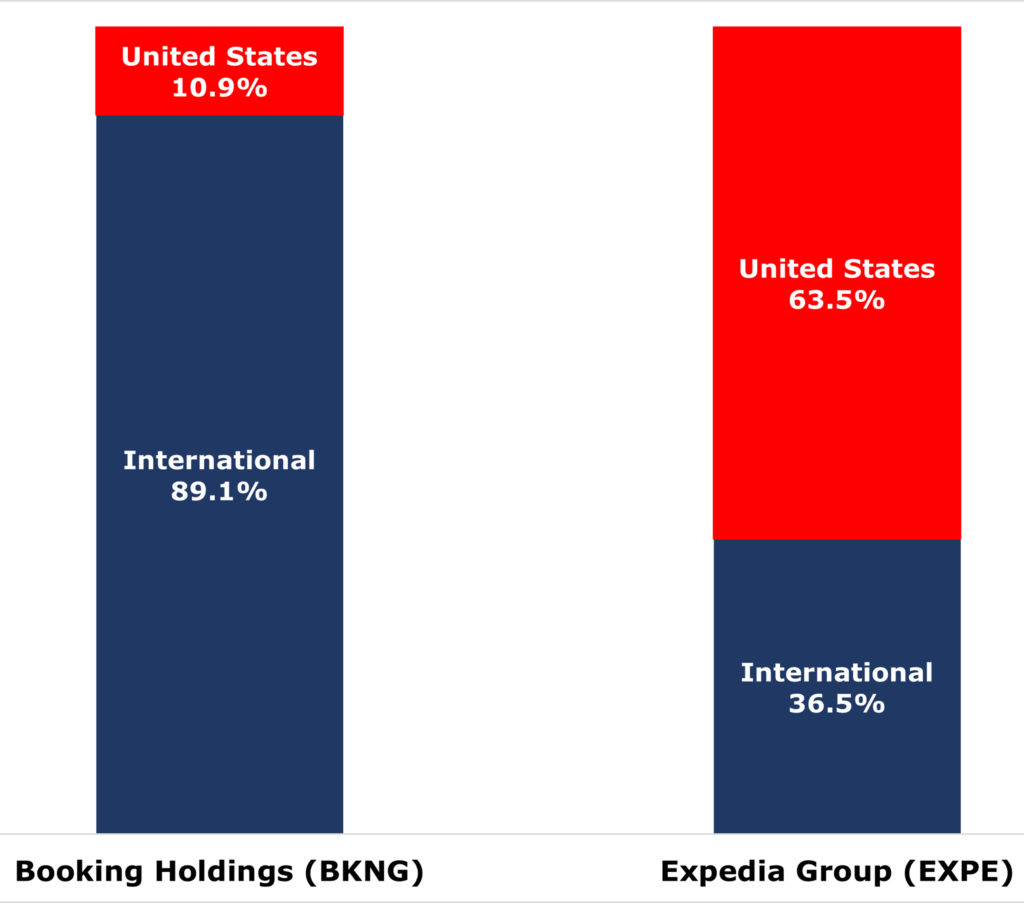
Agency Model
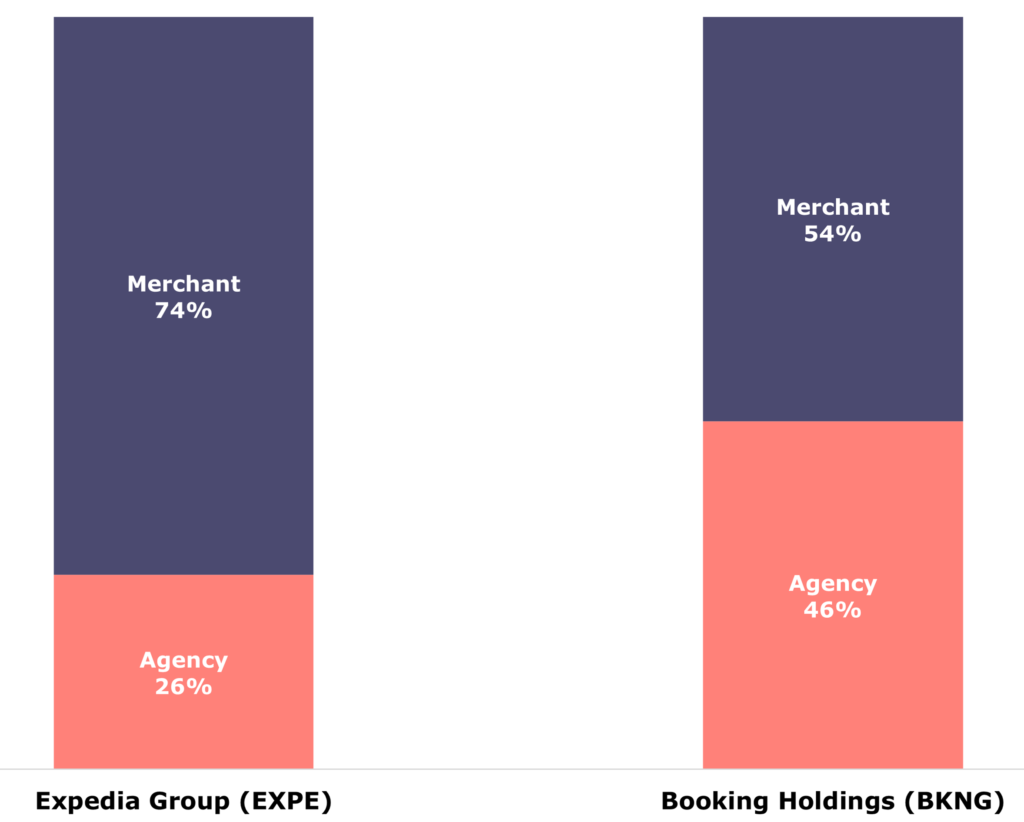
Traditionally, OTAs operated as successors to brick-and-mortar travel agencies, earning a commission on the value of bookings in a model known as the agency model. In this model, the OTA acts as an intermediary between the customer and the service provider, facilitating the booking process. The OTA earns a commission from the service provider for each booking made through its platform.
- This model is characterized by lower operational risk for the OTA, as it does not involve purchasing inventory upfront.
- OTA commissions can range from 10-30% of the booking value. The industry average is around 15%.
- However, results can have more fluctuations based on seasonality or prices charged by service providers.
Merchant Model
In the early 2000s, OTAs began to adopt what was traditionally reserved for specialist travel agents: the merchant model. In the merchant model, the OTA purchases inventory from the service provider at a wholesale price (typically at a 20-30% discount) and then sells it to customers at a retail price. The difference between the wholesale and retail prices is OTA’s profit.
- This model involves higher operational risk for the OTA, as it assumes the responsibility of selling the inventory. However, it can act as leverage for operating results.
- The merchant model also offers far better revenue stability as OTAs can exercise inventory management practices and a higher level of price control.
- The merchant model allows for easier refunds or rebookings and thus offers a better customer experience.
Rate Parity
What is true of both the merchant and agency models is that they involve rate parity agreements. These agreements are what they sound like; rates offered by OTAs, and service provider direct channels need to be the same or similar. Two levels have begun to take shape in different geographies based on regulations.
- “Wide” rate parity is the harsher of the two. No matter where a customer books, the rates will be the same, or the OTA will have the best rate.
- “Narrow” rate parity came about after European regulators challenged it as cartel-like. Narrow parity allows for a more floating policy regarding price offerings. This usually means that online prices are the same, but agreements cannot dictate direct sales through the phone or in person.
- Of course, there are also “no parity” agreements, in which neither party has a specific obligation to any term of the contract, including availability and rates offered.
A Virtuous Cycle
A trend that began to evolve until the pandemic was service providers taking a harder stance on OTAs eating into their margins. Service providers began to introduce their own booking websites, introduce rewards programs to drive loyalty, and fight several regulatory challenges that began to put OTAs on the back foot. However, the global pandemic and changing consumer habits made service providers begin to see OTAs for what they do best: marketing.
One of the key value drivers for OTAs is their ability to leverage the network effect, creating a virtuous cycle for everyone involved. Customers benefit from a wider range of options, service providers gain additional revenue channels, and OTAs enhance their brand recognition. Over time, enhanced brand recognition among customers and service providers can equally provide OTAs with further leverage in negotiating commission rates or wholesale prices for merchandising.
The billboard effect complements the network effect by providing significant incentives for hotels, other accommodations, and airlines to list their services on OTA platforms. Increased visibility, even through lower-margin channels like OTAs, can increase direct bookings. A significant portion of direct bookings (65%) for hotels originate from customers who initially found the accommodation through an OTA. For many service providers, this far outweighs the potential margin impact of OTAs.
Core Business
BKNG Core Growth: A Shift to Merchant
BNKG’s broader strategy is to shift more of the mix toward merchant offerings. According to BKNG, merchant offerings will provide a boost to top-line growth rates as they allow BKNG to dictate terms of payment with consumers. Potentially, this could allow for broader terms with consumers, which may include more payment methods or longer pay periods. BKNG’s dominance in the European market, in our view, can be largely attributed to its network effect at critical mass, being the ‘last man standing’ in the European OTA market. The shift toward the merchant model, coupled with strategic acquisitions, will be instrumental in driving future earnings growth.
Additionally, this shift will bolster loyalty program offerings and bundling and potentially facilitate an entrance into the B2B space. The BKNG Genius program is similar to a hotel or airline loyalty program. With certain milestones, such as 15 bookings over two years, customers can gain up to 20% discounts on stays and 10% discounts on rental cars. Merchant-heavy OTAs like EXPE have historically dominated bundling, as bundling services was nigh impossible through the agency model. Through the “Connected Trip” model, BKNG hopes to roll this out to consumers on a large scale in 2024, including accommodation, airline, experience and even travel insurance offerings. We believe that this will also spur an entrance into B2B sales. One of the key growth drivers for EXPE has been its extensive B2B offerings, which are only made possible by a large inventory.
While the merchant model does introduce a higher level of operational risk, we believe that BKNG’s operation of the discount OTA Priceline serves as an effective inventory obsolescence mitigator. Priceline has significant brand recognition as a platform for discounted travel. The original ‘Name Your Price’ model gained considerable popularity by allowing customers to bid on steeply discounted hotels, flights, or rental cars, with the specifics revealed only upon acceptance of the bid. The current ‘Price Breakers’ program continues this tradition, albeit exclusively for hotels and without the bidding, by offering substantial discounts while maintaining the same general model.
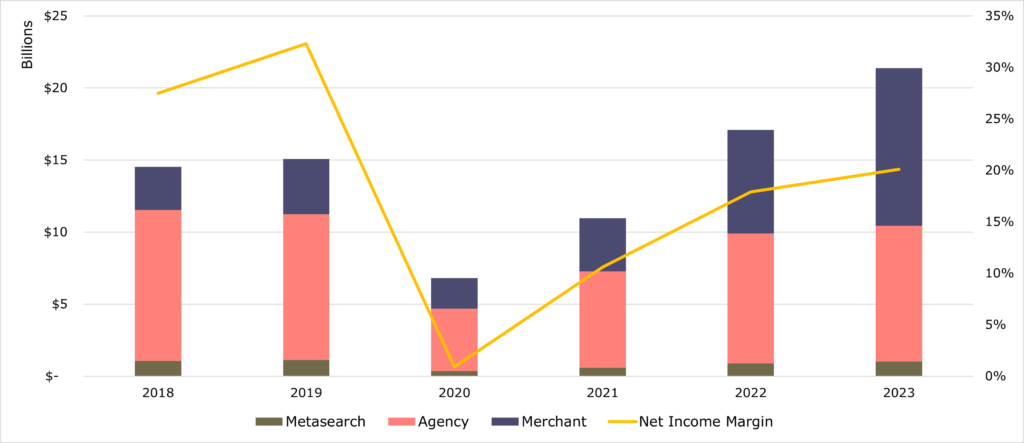
As a final benefit, BKNG could shorten its cash conversion cycle. If an OTA receives money from the consumer for the hotel room, it will generally only pay the hotel on the day of check-in, as the OTA may offer refunds or free rebooking. A shorter cash conversion cycle, and thus lower working capital, will significantly improve liquidity and further help offset the risk of holding expirable inventory.
EXPE Core Growth: Continued B2B Dominance and International Expansion
EXPE has parted ways with its CEO since 2020 and has appointed Ariane Gorin, former head of the B2B segment as the new CEO. Gorin has been a key leader in the B2B segment since 2014.
Over the course of the pandemic, EXPE entrenched itself in the US and put expansion of international offerings on hold. Through 2024, EXPE expects to restart significant spending to gain market share globally. We feel the sales to other travel agents will be a significant driver of medium-term revenue growth. While the North American and European travel segments are already dominated by EXPE and BKNG, the APAC market still has an extensive list of home-grown competitors. We expect EXPE and BKNG to conduct M&A in the APAC region over the long term. Over the medium term, local travel agencies are looking for access to US and European inventory to market to the rapidly growing consumer class. By 2025, APAC may surpass the US for gross booking value, with APAC travelers growing average spending per trip by nearly 32% in 2023.
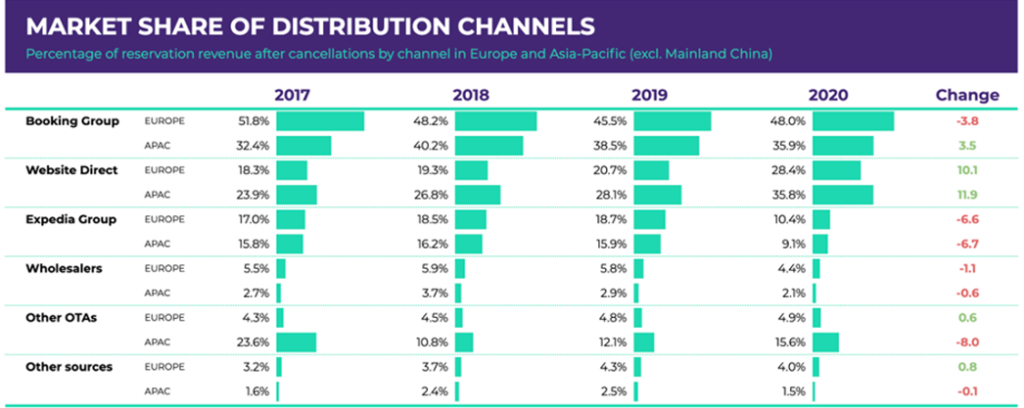
Similar to APAC, we believe that short and medium-term expansion in Europe will come in the form of B2B offerings and partnerships. EXPE is bulking up B2B offerings in Europe with two significant partnerships: Ryanair with “Ryanair Rooms” and Germany’s ADAC. Ryanair, Europe’s largest airline by passenger volume, is seeking to enter the bundled holiday market with Hotel offerings utilizing EXPE’s technology and inventory. ADAC is the German version of AAA and offers several travel discounts for local travel agents across Germany, who will all now have access to EXPE’s inventory. Additional partnerships have been announced, with Turkish Airlines and Iberia Airlines gaining access to more of EXPE’s inventory offerings for European customers. Finally, in 2024, EXPE will roll out the One Key membership program in Europe to directly compete with BKNG’s Genius program.
Going into 2024, EXPE will continue to consolidate core offerings into the largest three brands: Vrbo, Expedia, and Hotels.com. Initially, this consolidation program was started in 2018 to reduce the burden of having different administrative and tech units for each segment. Thus far, it has been successful in increasing margin and was executed in 2023 on the Vrbo platform. To date, EXPE has decommissioned 17 separate CRM systems and consolidated AI learning from 13 different stacks to a single one that could process 300 million customer data profiles. Better data visibility across segments will undoubtedly enhance potential AI offerings and further increase the penetration of the One Key loyalty membership program.
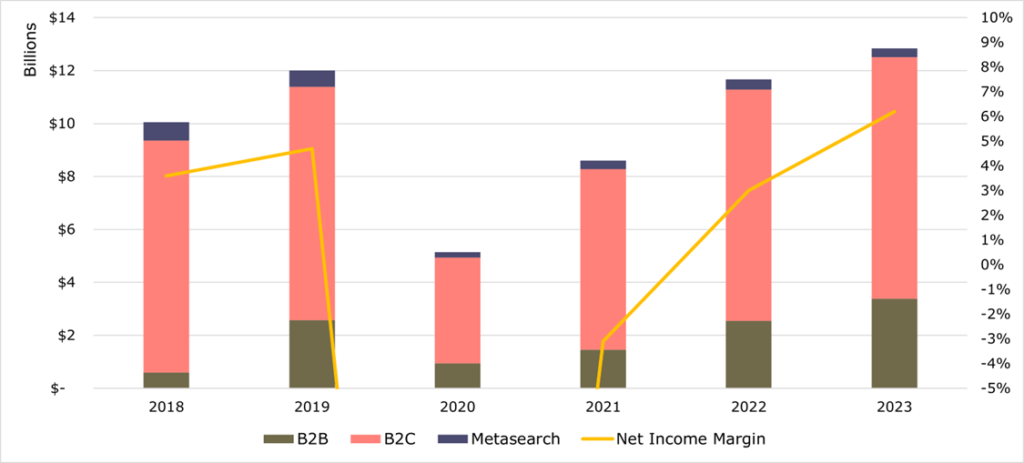
The Experience Economy
In Economics, the “experience economy” is a step above the service economy, characterized by premium-priced, highly differentiated experiences. The current “travel experience” market can best be boiled down into tours, attractions, or specialty events.
Tours and Experiences
The two dominant players in this market are the independent GetYourGuide and TripAdvisor’s Viator. Before the pandemic, gross bookings for the sector were only around $254 billion, with Skift estimating growth to $300 billion by 2025. In 2018, 80% of bookings were offline, and while online penetration is increasing, the problem for both BKNG and EXPE is one of comparability. As previously discussed, consumers overwhelmingly want choice without sacrificing value. For flights and hotels, this is easy as they have all but been commoditized. Experiences are still highly differentiated in both content and cost, which radically increases the length of the due diligence process for consumers and OTAs without offering much in the way of margin for OTAs. Despite posting $737 million in revenues for 2023, 41% of TripAdvisor’s total revenue, Viator posted EBITDA just shy of profitability
In 2018, BKNG acquired FareHarbor, a channel management system similar to what hotels use for operators. This allows tour, attraction, or other experience operators to list their booking availability on OTAs and other channels.
In 2023, both BKNG and EXPE unveiled AI-powered offerings that included elements like group trip planning and experience booking for the consumer, which heavily integrates experience listings into suggestions. The advent of artificial intelligence could significantly increase the ease of due diligence for all parties involved as AI learns what a consumer is looking for. While still utilizing the main Expedia brand for experiences, in our view, EXPE will likely use Vrbo to expand into the market as Airbnb has.
Artificial Intelligence
Generative AI holds significant potential for growth in the travel market, particularly through hyper-personalization. As consumers spend extensive time comparing vacation options and exhibit high abandonment rates for online bookings, AI can bridge the gap between customer preferences and OTA listings. Currently, OTAs have the necessary data for hyper-segmentation, but filtering out noise has been challenging and only offered differential gains. With the advent of AI, the cost of analysis could drastically decrease, making hyper-personalization more feasible and economically viable. McKinsey estimates travel firms could see a 15-25% increase in EBIT, while Skift sees a $1.8 billion market for AI-powered chatbots in travel planning. Equally, it could allow for a level of price discrimination between levels of consumers that could drive both volume and margin enhancements.
Both Expedia and Booking Holdings have started offering AI-powered travel planners, aiming to personalize the travel experience from planning to return. However, marketing these tools poses a challenge, as consumers appreciate the convenience of AI but are hesitant about its overt use. The technology is still in its infancy but leveraging it could lead to significant growth and market penetration
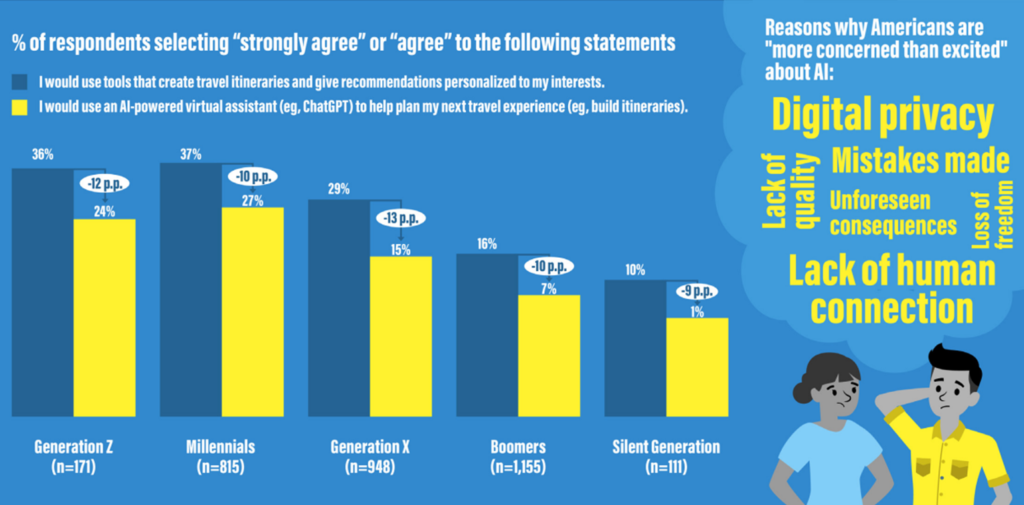
EXPE stated that with the final transition of Vrbo to the new tech stack, their AI training would be 8x more effective going into 2024, with 13 different training models being merged into a single one. An initial goal for their AI program is to give the best possible upsells to customers either before or during a trip. BKNG’s “Connected Trip” strategy has AI as a central part, with Priceline and Booking.com now having AI trip planners. BKNG also spoke more candidly about internal uses for generative AI, including piloting generative AI assistants for software developers to increase productivity and using AI to better select both merchant and agency inventory.
With record travel expected in 2024, it will be a telling indicator of how well travelers will receive AI-driven innovations and how they will affect the competitive landscape. The ability to harness vast amounts of customer data effectively will be a driver of growth and competitiveness in the AI era.
Restaurants
BKNG owns OpenTable, which is a novel online restaurant reservation service. The competition in this area is also in its infancy, with the largest competitors being American Express’ Resy and TripAdvisor’s European TheFork.
OpenTable boasts 1.6 billion diners seated per year and a suite of B2B features for restaurants to enhance the value proposition of the roughly $1/seated customer and $299/mo fee. However, the network and billboard effect again reigns supreme, with more than 60,000 restaurants now listed globally, dwarfing the 16,000 of Resy and equal to the more geographically restricted TheFork. As for customers, OpenTable is again at the top, with more than 134 million users per month. This dwarfs TheFork’s 30 million and Resy’s 40 million.
Alternative Accommodation
Once considered a disruptor or competitor with the traditional hotel space, alternative accommodations have grown to make up approximately 20% of global lodging revenue. The segment has become the next domain for the quest for differentiation by hotels and OTAs alike. In 2022, consumer demand for alternative accommodation was 100 million room nights or only around 10% of total hotel demand. However, it made up approximately 20% of lodging revenue and had almost double the supply of hotel rooms. By far, this area will represent the highest growth by volume for both EXPE and BKNG, with the alternative accommodation market growing at 16.5% CAGR to 2030.
EXPE has been increasingly focusing on its vacation rental platform, Vrbo, which has a well-established customer base and brand recognition in North America. During 2023, spending was down at Vrbo due to the migration of the tech stack, which EXPE expects to make up in 2024. EXPE says that a growth driver for further customer retention and differentiation from competition at Vrbo will be their rewards offerings through their One Key program, which now allows customers to earn and spend rewards points across all EXPE offerings.
| Alternative Accommodation Listings (Millions) | |
| Booking Holdings (BKNG) | ~7.2 |
| Expedia Group (EXPE) | ~2 |
| Airbnb (ABNB) | 7.7 |
The largest growth area for Vrbo has been the urban market. Currently, Vrbo is not weighted to urban stays like some competitors. While management has not decided to shift on a wide scale to urban areas, in 2024, some urban alternative accommodations will be listed on other EXPE OTA products that are not currently on Vrbo. EXPE expects Vrbo to grow by 10% in revenue, coinciding with a 10% increase in gross booking value. Additionally, the tech stack migration will also bring Vrbo EBITDA margin in line with the rest of the company.
While certainly not commanding the same brand recognition as Airbnb or EXPE’s Vrbo, BKNG has quietly expanded its non-hotel accommodation offerings. For the full year 2023, BKNG saw 33% of room nights come from alternative accommodation, with particular supply-side strength in the US. While being the most geographically restricted of the major players, BKNG grew alternative offerings by 12% in 2023 while growing total bookings by 24% year over year. On a go-forward basis, BKNG certainly does have an uphill battle to gain market share, particularly in the US, but expects strong above-core growth in the area and further volume improvements in the US for both supply and demand in 2024.
Rewards Offerings: Driving Loyalty and Repeat Business
Traditionally, rewards programs were dominated by non-OTA loyalty programs. EXPE research shows that loyalty is a major factor in booking decisions, with loyalty customers being less price conscious and 61% stating the reason behind this is the collection of points or rewards for future travel.

Already, 50% of travelers are members of some rewards program, giving both EXPE and BKNG a significant value proposition to offer rewards on the total trip rather than just hotel brand or airline. The lack of penetration of OTA loyalty offerings has contributed to a lack of “sticky” customers exercising brand loyalty to an OTA. According to EXPE, it’s One Key members book 3x as many trips as non-members.
With 10 brands in the portfolio, EXPE had significant horizontal diversification that it had been unable to take advantage of until the tech stack migration. The comprehensive launch of One Key combined more than 100 million rewards members into a single system that enables cross-spending across all EXPE offerings, including Vrbo, flights, and experiences. Through 2023, EXPE indicated that it is seeing better cross-shopping and repeat rates improve as customers realize how broad One Key offerings are. 2024 will see the scaling of the One Key program internationally. BKNG’s Genius program will equally see global rollout in 2024, but more of note is the launch of the program across all verticals, including non-accommodation. Consumers may find the upfront discounting factor of BKNG’s offerings more appealing than the very traditional points collected by One Key. However, management has kept plans and metrics surrounding the Genius program close to their chest but has indicated that they are still developing their strategy surrounding it.
Risks
OTAs face growing competition from those outside the traditional travel service business. These come mainly from search engine aggregators (frequently called Metasearch), new entrants, and direct service provider channels. However, we feel regulatory risk is the largest factor at play.
Both EXPE and BKNG have come under scrutiny for the usage of “rate parity” agreements in Europe. BKNG has thus far taken the brunt of this, with the Spanish anti-competitive authority fining BKNG EUR500m for “anti-competitive practices” in late 2023 and the Italian anti-competitive authority opening an investigation in March 2024. A decision weighing heavily on the future of OTAs European offerings is the European DMA (Digital Markets Act). On March 1, 2024, BKNG was required to register as a “potential gatekeeper,” which would subject them to DMA provisions within 6 months of registry. The DMA requires OTAs to share certain data with competitors, potentially eroding their competitive advantage provided by information asymmetry. Additionally, the DMA aims to prevent large online platforms from favoring their own private label or rank those who pay higher, which could seriously erode the economics of the shift toward the merchant model and even erode the margin of existing agency offerings.
On a broader level, EXPE has 74% of its operations in the merchant model, with BKNG holding 54% and growing. The merchant model in the event ticket space has seen increased regulatory scrutiny, including a high-profile antitrust suit against TicketMaster. Additionally, alternative accommodations have begun to come under scrutiny on a local level, with several cities in a wide variety of geographies – including NYC – posing harsh regulatory requirements on those seeking to list their property on short-term rental sites. Vrbo and Airbnb have both been vocally fighting this, with BKNG likely to soon join the fight as EU regulators have issued an intent to regulate short-term rentals on a broad scale.
Visibility risk in the travel industry is significantly influenced by the sector’s inherent seasonality, characterized by three distinct periods: peak season (May-September), shoulder season (April and October), and off-season (November-March). This cyclicality poses challenges for OTAs in terms of forecasting demand, optimizing inventory, and setting pricing strategies. Given this seasonality and volatility, it can be challenging to make investment decisions, plan marketing campaigns, or develop new products and services.
Financials
Financials for both firms are being driven by substantial tailwinds in the pricing of accommodation, pent-up travel demand, and airline ticket prices. However, we do expect to see a softening in the price of airline tickets as demand reaches above 2019 levels. The tailwinds in accommodation pricing are likely to be stickier in our view, as occupancy rates still have not recovered to pre-pandemic levels and supply growth continues to be constrained.
BKNG expects to end 2024 in a meaningfully better position than in 2019, while EXPE still expects some difficulties in the first half of the year before reaching acceleration in the second half of the year.
| Booking Holdings (BKNG) | |
| Business Unit | Description |
| Booking.com | Primary OTA |
| Priceline | Discount OTA |
| Kayak | OTA/Metasearch |
| Agoda | APAC OTA |
| OpenTable | Restaurant Reservation Platform |
| RocketMiles | OTA/Reward Aggregator |
| FareHarbor | B2B Experience Channel Manager |
| Cheapflights | Metasearch |
| Momondo | Metasearch |
BKNG expects 8% top-line growth or around 15% EPS growth for 2024. Despite a 10-15% uptick in advertising spending expected in 2024, BKNG expects EBITDA to grow at a pace faster than revenue due to a continued shift into the merchant space. BKNG averages a gross booking margin of 14.2% or a full year 2023 net income margin of 20.1%, which is far more favorable than EPXE’s 5.4%.
In our view, the gulf between BKNG and EXPE’s gross booking margin can be accounted for in the relative fragmentation of the non-US hotel market. Around 40% of US hotels are independent, while nearly 80% of European hotels are. An effect of this is that many European hotels see OTAs like BKNG as a primary channel, rather than a secondary one. Additionally, since 2019, BKNG has increased total air tickets booked by 400%, which has caused serious tailwinds during the release of pent-up demand and high-ticket prices during the 2021-2023 period. However, we feel that this tailwind will slowly dissipate over time as real travel spending meets the pre-pandemic level in 2025.
BKNG’s ended 2023 with more than $12 billion in cash on hand. While total debt is high, BKNG maintains an A- rating and favorable interest rates, with an interest coverage ratio of 7.1. Previously, BKNG generally ran with negative net leverage. Management stated that the new net leverage target is 1.0x, while keeping its gross leverage at a 2x target. This is aimed at preserving its credit rating while also enhancing its capacity for shareholder returns. Management states that in the short term, it expects to return more than free cash to shareholders. This approach may also serve as a tax efficiency measure, particularly with the implementation of the EU’s new corporate minimum tax of 15% in 2024. BKNG currently benefits from a tax policy that allows it to pay a reduced rate of 9% due to a significant portion of its revenue originating from certain types of intangibles.
BKNG expects fixed costs, likely advertising and other infrastructural changes to support the merchant spend, to grow at 10-15% in 2024. We believe is part of an effort to maximize investment before the consumer upcycle takes hold. Full benefits from this spending, according to BKNG, will be seen in 2025. For the full year 2023, BKNG had a 57.9% return on capital employed, and with the previously discussed cash position going into 2024, we expect to see M&A activity. In our view, BKNG’s long-term growth strategy is heavily influenced by acquisitions, focusing on customer acquisition and expanding the breadth of existing service offerings. A notable example is its attempted acquisition of the Swedish flight booking platform eTraveli for $1.7 billion USD, although this was blocked by European regulators. With an additional $1.7 billion USD on its already cash-rich balance sheet, BKNG may pursue more substantial acquisitions in the near future to accelerate its top-line growth. Particular target regions, are likely to be APAC or the United States.
For 2023, BKNG saw a return to form in regard to free cash flow, growing 13% year over year to $7 billion. We expect stronger free cash flow growth as the shift to merchant resumes, though pending fines from Spanish regulators may affect results in the quarter ending March.
BKNG repurchased $10 billion in shares during 2023, a 9.5% shrinkage year over year. Additionally, BKNG has now begun to pay a dividend for the first time, $8.75/share quarterly or yielding 1.00%. However, it does not expect to shift the shareholder return strategy to be weighted toward dividends. By 2026, the total share count will shrink by an additional ~11%, with $14 billion remaining on the repurchase authorization.
| Expedia Group (EXPE) | |
| Business Unit | Description |
| Expedia | Core OTA |
| Hotels.com | Hotel OTA |
| Vrbo | Core Alternative Accommodation |
| Orbitz | Metasearch |
| Travelocity | OTA |
| Trivago | Metasearch |
| Hotwire | Discount OTA |
| Wotif | Australia Hotel OTA |
| CheapTickets | Discount OTA |
EXPE’s top-line growth is expected to face some headwinds, particularly in air bookings, early in the year, which will amount to mid-single digit increases in revenue at the end of March 2024. As the travel peak season begins in May, we expect to see top-line growth rates increase both from volume increases and the launch of One Key products globally. According to guidance, growth will be linear through 2024, likely ending the year with a total 10% year-over-year revenue growth. EXPE’s balance sheet is weaker, with a gross leverage of 3.7x, which is moving down toward a target of around 2.0x or lower. EXPE states that they intend to do some early repayments of debt to reach the leverage target.
EXPE ended the year with $4.2 billion in cash on hand and generated $1.8 billion in free cash flow. For the full year 2023, the return on capital employed for EXPE was a more disappointing 13.92%, though largely this is because of front-loaded spending on migration and G&A consolidation. We expect to see continued G&A savings in 2024, and a reduction in Capex spending from EXPE given the migration to a single backend is now largely complete. However, EXPE does expect a one-time $100 million cost impairment regarding a further 8% headcount cut, which will be largely realized in the quarter ending March 2024. In our view, this will translate to net income margin increases in line with last year, which saw around 200bps of expansion to 5.4%. Gross booking margin has been creeping up, ending 2023 at 12.3%, a 40-bps increase since 2021.
EXPE completed $2 billion in share repurchases in 2023, the largest ever for them which on a diluted basis reduced diluted outstanding share count by ~7.0%. EXPE still has some $4.8 billion in authorization, which on a diluted basis would be ~24% of shares.
Conclusion
In conclusion, Booking Holdings (BKNG) and Expedia Group (EXPE) are both pivotal players in the OTA market. BKNG’s dominance in the European market and its shift toward the merchant model have been key drivers of its superior margins. The company’s strategic focus on expanding its customer base and leveraging its network effect for further growth in offerings has contributed to its excellent fundamentals. Despite some regulatory challenges, BKNG’s strong free cash flow, strong balance sheet, and share repurchase program make it an attractive buy-and-hold investment.
EXPE’s recent tech and administrative migration has the company at a turning point, and headwinds dissipating may suggest it is undervalued by the market. The consolidation of customer data across its brands into a single platform and significant administrative savings are both expected to unlock substantial value for both customers and shareholders. Additionally, a focus on new loyalty offerings and a renewed global expansion program indicate a promising outlook for margin expansion, earnings growth, and long-term capital appreciation.

